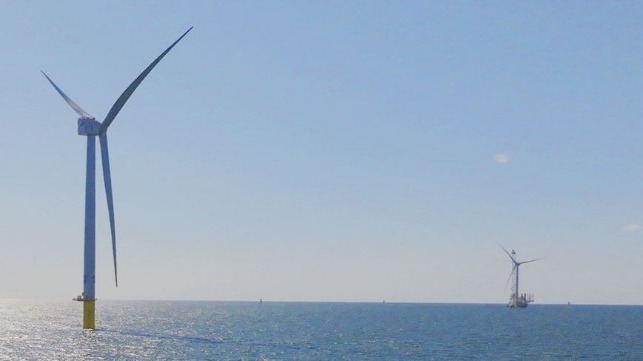Three-State New England Wind Solicitation Delayed for Tax Guidance

Citing the need for additional guidance from the federal government on the tax code as it pertains to energy credits, Massachusetts along with Connecticut and Rhode Island informed regulators at the end of last week that they intend to delay their current offshore wind solicitation program. The three states had agreed to a coordinated solicitation which is currently underway and was scheduled to close at the end of the month, but will now be extended by at least two months.
“In light of the current uncertainty around federal tax guidance,” the states wrote to the regulators saying they are “concerned that the existing solicitation schedule may produce bids that do not maximize the potential clean energy tax benefits of offshore wind.” They write that they believe it is critical to revise the schedule to encourage the most cost-effective bids.
Tax credits had previously emerged as one of the issues cited by the large developers as one of the hurdles to proceeding with large U.S. offshore wind farms. In addition to the impact of inflation and supply chain problems including a shortage and delays for install vessels, Ørsted for example cited the problems in realizing proposed tax credits as one of the challenges that had caused it to review and abandon U.S. projects. The company reported it expected as much as $5.5 billion in impairment charges as its abandoned U.S. projects including a large wind farm planned for the coast of New Jersey.
The U.S. Treasury Department has been slow to issue the guidance the industry is looking for and which the state power authorities believe will impact the future proposals they receive from developers. The Inflation Reduction Act passed in 2022 includes key provisions for an Investment Tax Credit, which would be a key tax credit available to offshore wind projects. Treasury needs to issue its guidance which is expected to include additional types of energy projects covered under the Inflation Reduction Act.
“The provisions could potentially reduce costs and resulting bid prices within offshore wind proposals,” writes the Massachusetts Department of Energy Resources to the state’s Department of Public Utilities explaining the decision to delay the submission date for the current solicitation.
The U.S. Treasury Department was accepting comments on its proposed guidance through today, January 22. They have scheduled a public hearing for February 20 and are expected to finalize the guidance shortly after the hearing.
Massachusetts agreed with its two neighboring states to coordinate the three states’ solicitation in an effort to provide better opportunities and clarity for developers. They also sought to expedite the process setting the timeline for proposals by January 31, selection by June 12, and executing long-term contracts by August 14.

that matters most
Get the latest maritime news delivered to your inbox daily.
Each of the states has faced challenges due to the changing economics of offshore wind projects and their development. Massachusetts was the first to become involved in a dispute with developers seeking to reset previous power purchase agreements while the other states also have faced similar challenges from the industry. Part of the urgency was to provide an opportunity for federally selected projects to rebid their power agreements with state regulators.
The letter announced that they would be delaying the submission date as well as the selection and contract target dates each by approximately two months. They are now calling for submissions by March 27, hoping that the delay will provide enough time for the federal guidance to be finalized and developers to factor it into their proposals to the states.
